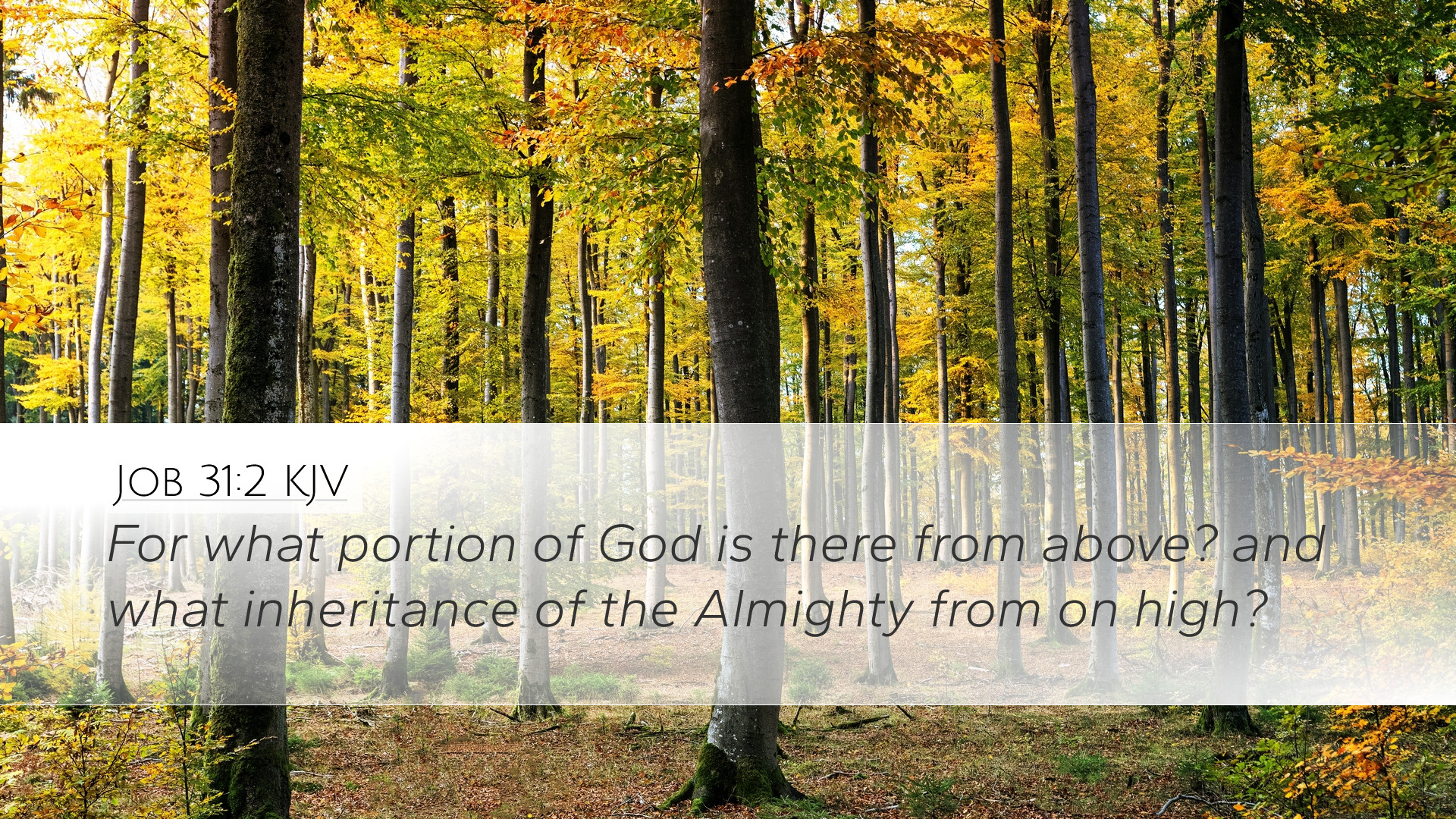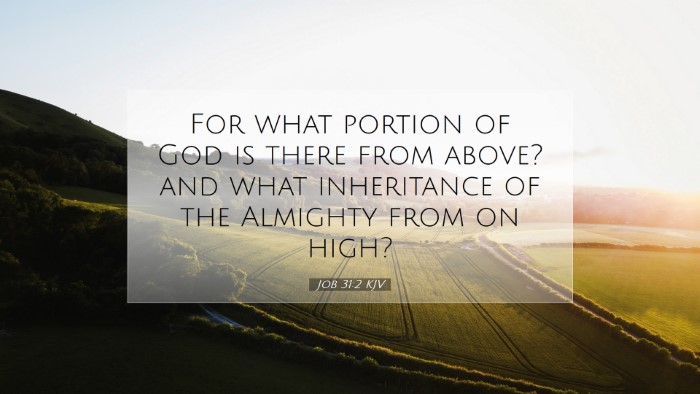Commentary on Job 31:2
Job 31:2 (KJV): "For what is our portion from God above, and our heritage from the Almighty on high?"
Introduction
The verse from Job 31:2 encapsulates a profound inquiry into the nature of divine justice and the relationship between God and humanity. In this chapter, Job defends his integrity and expresses a longing for understanding regarding his suffering and his standing before God. This commentary seeks to draw insights from esteemed public domain commentaries to delve into the theological implications of this verse.
The Context Within the Book of Job
The Book of Job presents a rich narrative that explores themes of suffering, righteousness, and the sovereignty of God. Job, a man portrayed as blameless and upright, experiences immense suffering and loss. His friends offer various explanations, suggesting that suffering is a direct result of personal sin. However, Job maintains his innocence, which reaches a peak in this declaration.
Job's Assertion of Innocence
In the preceding verses, Job outlines the righteousness of his actions, proclaiming that he has lived a life of integrity and faithfulness. Matthew Henry comments that Job’s strong retort against his accusers reveals his deep understanding of God’s justice and righteousness. It emphasizes that true righteousness transcends mere adherence to the law, implying a profound relationship with God.
Understanding "Our Portion" and "Heritage"
Job questions what can be expected from God if his life reflects fidelity. The terms "portion" and "heritage" are significant. Albert Barnes notes that these terms indicate blessings, both earthly and spiritual, that one might anticipate from God for living righteously. Job's inquiry suggests a disillusionment with the belief that virtue always leads to prosperity in this life.
Theological Implications
This verse opens a discussion on the nature of divine reward. Why do the righteous suffer, while the wicked prosper? Adam Clarke observes that Job's plight invokes a challenge against the simplistic theological notion that good deeds yield rewards and evil brings punishment. It raises questions about divine providence, suggesting that suffering may be an integral part of one's relationship with God, rather than a punishment for sin.
Exegesis of Job 31:2
In this verse, the two main components reflect Job's acknowledgment of God's sovereignty over life. The phrase "our portion" refers to the inheritance and blessings God allocates to His people, being a central theme in Hebrew thought. Contrastingly, "the Almighty on high" highlights God's transcendence and power, emphasizing His role as the supreme being who governs the universe.
Job's Yearning for Divine Understanding
Job's question is not merely rhetorical but a heartfelt plea for clarity. Matthew Henry suggests that Job is searching for a comprehension of divine providence amidst his turmoil. It implies a deeper existential inquiry into what truly constitutes a reward from God.
The Relationship Between Righteousness and Divinity
Through this verse, Job asserts that righteousness is not transactional. Job does not believe he earns his place with God through good actions; rather, he expresses a desire for relationship and understanding. Thus, it is not merely the 'reward' of earthly blessings that he seeks but a deeper connection with God, showcasing the essence of true worship and faith.
The Pastoral Application
This commentary on Job 31:2 offers rich material for pastoral reflection. For those in ministry, the crux of Job’s assertion serves as a reminder that the faithful often encounter suffering without clear explanation. As such, the emphasis on a deep, trusting relationship with God can serve as a source of hope and strength for congregants facing their trials.
Encouragement in Suffering
In life’s uncertainties, this passage encourages believers that a holy life does not necessarily insulate them from hardship. In guiding others, ministers can reflect on Job's example, illustrating that questions of God can stem from a place of faith, demonstrating the importance of grappling with unanswered questions within one's faith journey.
Pointing to the New Testament
Pastors might also connect Job's inquiry to the New Testament's teaching on suffering and reward. Romans 8:18 reminds believers that "the sufferings of this present time are not worth comparing with the glory that is to be revealed to us." Such connections can deepen congregants' understanding of the role of suffering as a precursor to spiritual maturity and relationship with God.
Theological Reflection for Students and Scholars
For students and scholars of theology, Job 31:2 presents fertile ground for exploration of classical theodicy—the justification of God's goodness in the presence of evil. This interaction between Job and divine justice exemplifies the complicated nature of faith in light of suffering.
Diving Deeper into Divine Justice
Scholars may analyze how Job’s questions resonate through centuries of theological discourse, challenging reductionist views of divine justice. Adam Clarke calls attention to the broader implications of Job’s plight for an understanding of justice that is not merely based on human perceptions of reward and punishment but is instead rooted in divine purpose beyond human comprehension.
Connecting Job’s Experience to Modern Faith Challenges
Discussions around Job’s expression can also engage with contemporary concerns about theodicy and the problem of evil. In bridging Job's time and today, one might argue that the struggle with comprehending God’s allocation of justice remains central to the faith experience.
Conclusion
Job 31:2 encapsulates a powerful theological inquiry into God's relationship with humanity amidst suffering. By drawing from the insights of public domain commentaries, this exploration enriches our understanding of Job's lament while simultaneously challenging us to confront our own questions about divine justice, reward, and righteousness. The passage serves not only as a historical reflection but also as a contemporary guide for believers navigating the complexities of faith.


